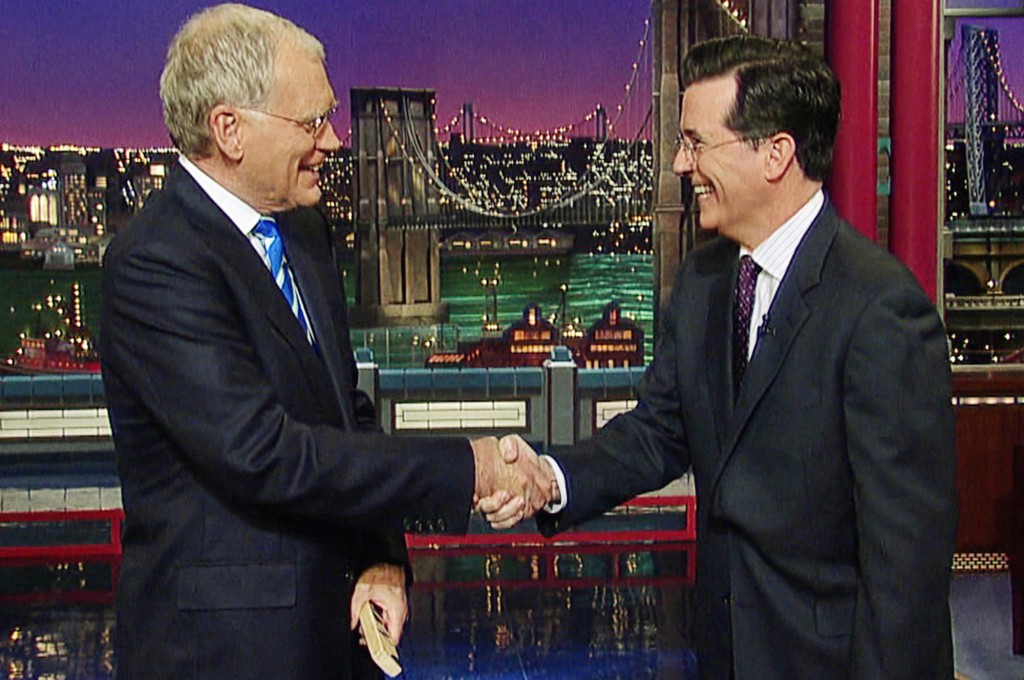Colbert’s Move to the Late Show
For Colbert, the move to the Late Show on CBS is an obvious good one. As Louis C.K. reminded us in a compelling three-episode story arc during season 3 of Louie, the seat currently occupied by Letterman is the apex (however daunting) of a particular career trajectory. And of course, Colbert has long tried to keep pace with his best frenemy, Jimmy Fallon. They’ve fought over Emmy awards and ice cream flavors, so it only makes sense now that Fallon has moved to the Tonight Show, that Colbert really couldn’t stay on basic cable much longer.
For CBS, the strategy here is equally clear. Fallon is trying to reinvent the form of late-night chat for a 21st century audience, and Colbert certainly is a strong choice to lead a similar effort at CBS. Les Moonves and crew are hoping Colbert will bring to the Late Show the same youthful audience he has on Comedy Central. Research from the Pew Center identifies The Colbert Report audience the youngest among all news and public information programs, with 43% of the audience between the ages of 18-29, and fully 80% 49 or younger. By contrast the late-night audience has, in general, gotten older each year, with the average age for Letterman’s Late Show climbing north of 58-years-old in 2013. Colbert has also cultivated a highly committed fan base. On the first episode of The Report, he proclaimed his audience to be the “Colbert Nation,” inviting his viewers to identify with him and, more importantly, one another. Now CBS is hoping that the citizens of the Colbert Nation will immigrate to the vaster, but rapidly depopulating continent of network TV.
A key to that will be the extent to which Colbert’s Late Show will be able to exploit its host’s internet savvy. Colbert has, over the years, offered numerous provocative performances, both on and beyond TV, that were designed, as Henry Jenkins and colleagues would put it, to be spreadable among horizontal, digital pathways of content exchange. He also has routinely provided his audience opportunities to participate in the construction and circulation of satirical and parodic content. If the network late-night chat show is to remain a relevant textual form, it will need to move in similar directions. That will be one of Colbert’s challenges.
But the move is not without risk, either. Much of Colbert’s appeal has been his daring, from his subversion of the White House Correspondents Dinner in 2006 to the recent, and less-well received, resuscitation of his controversial character “Ching Chong Ding Dong” as a means of critiquing ethnic stereotypes. This experimental risk-taking has been enabled both by the looser institutional environment of cable TV, and by his enigmatic character. After all, because the Colbert who hosts The Report is a mask – a cartoon character of sorts – he is free to say and do things that could be quite dangerous for a real person. Not even Jon Stewart enjoys the kind of discursive freedom Colbert does. He’ll be far more exposed, though, when he transitions to network TV, leaving behind both the character and the snug confines of Comedy Central.
Undoubtedly, Colbert will be as sharp and witty on the Late Show as he is on The Report, and the form is flexible enough that he will have room in which to work. One major question, though, is how much of his political edge he can retain. Network TV has never been a place for edgy political commentary, let alone the kind of media criticism that The Colbert Report so often offers (and for which some of us loyal viewers tune in). It’s never been much of a place either for exploration of the avant-garde. But those forays into the unfamiliar have been what has made Colbert so thrilling to watch over the past eight-and-a-half years. For this to work, he (and CBS) will need to strike a careful balance between the boundary-probing experimental work that defines The Report, and the mass market, consumer-friendly appeal that has long been the network late-night stock-and-trade.
The other major question this move leaves us with is who will fill Colbert’s shoes? Comedy Central has plenty of talent to shift into the 11:30 time slot, but the wider landscape of American political media will be losing one of its most important voices. For several years, Colbert has been doing what I’ve referred to as the “heavy lifting of the Fourth Estate.” At this point, it is far from clear who will take on that role next.




[…] column by Dr. Geoffrey Baym has been posted in Antenna: Responses to Media and Culture, discussing the replacement of David Letterman with Stephen Colbert on the Late Show. Dr. Baym, who […]
Good points, all. Another risk is how the current fanbase, enjoying the mask of S. Colbert, will like “the real thing.” As Geoff says, there will be one less layer of artifice, which has allowed the creativity and freedom of The C. R.
One query: will Late-Late night on the networks eventually become a lot closer to the Cable parodies? Recall the crazy stunts that David Letterman did earlier in his late-late experience. There is room for experimentation there, if only because the audience is so much fewer – and either incarcerated or intoxicated….or both.
[…] an April 11, 2014, post for Antenna, “Colbert’s Move to the Late Show,” Geoffrey Baym discussed the strategies, challenges and implications of political comic Stephen […]